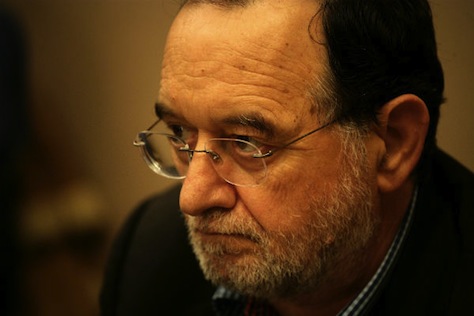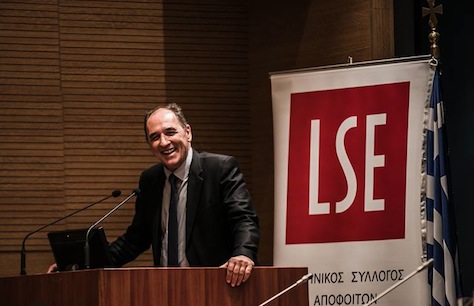With the Greek far left set to take power after Sunday’s staggering parliamentary elections, its next prime minister Alexis Tspiras will be just one of many key figures who will now become the central players in the latest chapter of the European Union’s economic policy debate.![]()
After Tspiras, no one will be more important than the economic advisers to whom the new government will entrust its attempt to reverse Greek economic policy and to negotiate debt relief from skeptical European Union leaders and international bondholders.
* * * * *
RELATED: EU should give Tsipras a chance to govern
* * * * *
Among the chief economic advisers to Tsipras and the soon-to-be-governing SYRIZA (the Coalition of the Radical Left, Συνασπισμός Ριζοσπαστικής Αριστεράς) are a handful of colorful personalities, from moderates to Marxists, all of whom will shape Greek economic policy in the years ahead.
Varoufakis: the political neophyte and telegenic economics professor
Yanis Varoufakis, an economics professor at the University of Athens, is widely tipped to become Greece’s next finance minister or, at the very least, lead the new government in negotiations with the troika — the European Central Bank, European Commission and the International Monetary Fund — and other EU leaders. Until very recently, Varoufakis was an outsider to Greek politics. He’s not a politician and, until recently, was a visiting professor at the University of Texas in Austin.
Varoufakis, however, was invited to run for a parliamentary seat by SYRIZA’s leaders. His international profile (Varoufakisis half Australian) and fluent English skills mean that he could soothe international markets as the chief economic spokesperson for Greece’s new government. A former adviser to George Papandreou in the early 2000s, Varoukakis has been a strident critic of the austerity measures that, first Papandreou and, since 2012, outgoing prime minister Antonis Samaras have accepted as conditions for Greece’s two bailouts, totaling €240 billion. In his announcement that he would stand as a candidate for the Hellenic Parliament, he compared that austerity to ‘fiscal waterboarding’:
Instead of discussing, in the European Union’s fora, the nature of our systemic crisis, the powers-that-be were busy fiscally waterboarding proud nations, letting them take a few short breaths before submerging them again into the waters of illiquidity.
Somewhat unusually for a European finance minister, Varoufakis has not shied away from criticizing the United States. Three years ago, Varoufakis wrote a book, The Global Minotaur, that paints a menacing portrait of the role of US economic policy vis-à-vis the rest of the world and American workers. Varoufakis is an outspoken critic of other aspects of US policy as well, including the US attack that killed Al Qaeda leader Osama bin Laden in May 2011:
A superpower gloating over the body of an extra-judicially killed killer. The powerful sovereign extending its power to a far away land to put to the sword a ruthless opponent. Not even a whisper about the demands of jurisprudence that ought to be universal and independent of the hideousness of the defendant. The postmodern middle ages in all its glory.
Nevertheless, Varoufakis is among the more pragmatic figures within SYRIZA’s arsenal of potential finance ministers, and he’s argued that the cycle of austerity, mixed with greater amounts of debt, has been detrimental to Greece and to Europe. Even two years ago, he was making the sensible case for why US and EU officials shouldn’t fear an eventual SYRIZA victory:
SYRIZA plans to fight both rising hunger and a xenophobic neo-Nazi party, Golden Dawn, with school lunches and food stamps. A SYRIZA government would seek these reforms and the salvation of the European project. And this can be only a good thing for the United States.
In an interview earlier this week with Michal Rozworski of Ricochet, Varoufakis outlined what sounds very much like the agenda of Greece’s next finance minister:
There are three things. Firstly, to conduct thorough, tough negotiations with our European partners, the IMF, the European Central Banks in order to revise, radically, the illogicality of our loan agreement with our creditors. Task number one is renegotiation to put it bluntly.
Task number two is to address, somehow, the humanitarian crisis by spending what’s really a small amount of money feeding the hungry, making sure that children don’t have to work by candlelight at night doing their homework and looking after the weakest and more innocent victims of this crisis. That’s the second task: the humanitarian crisis in brief.
And thirdly, to ensure from a fiscal point of view that the revenues of the state do not collapse as a result of some kind of strike by those who have the capacity to pay taxes.
Dragaskis: a former minister and SYRIZA’s top economist
Yiannis Dragasakis, a former communist and a longtime SYRIZA economist, is the only SYRIZA legislator who actually has top government experience, serving as a deputy minister of national economics in the short-lived technocratic government of prime minister Xenophon Zolotas between 1989 and 1990. Dragasakis, at age 68 and a moderate within SYRIZA, is most often mentioned, along with Varoufakis, among the top candidates to assume the finance portfolio. Regardless, Dragasakis will almost certainly hold a key ministry in the next coalition government, and he has served as the senior economist crafting the SYRIZA economic platform over the past three years.
Throughout the campaign, Dragasakis has argued that Greece cannot truly recover with a debt burden that now amounts to €320 billion — or around 170% of Greek GDP. Dragasakis says that a haircut is the only way for Greece to rebound in the long run because its public debt level isn’t sustainable, and that the costs of servicing Greek debt will hamper its government’s ability to boost growth for years, and possibly, decades, to come. In fact, Dragasakis points to the targets agreed under the 1993 Treaty of Maastricht, which established the single currency, that GDP shouldn’t exceed 60% of GDP to bolster his case for debt relief. Ominously, however, Dragasakis has also threatened that if European leaders can’t arrive at a solution by around July, when the Greek treasury’s funding would start to dry up, a SYRIZA government would find an ‘exclusively Greek’ solution — meaning a debt default that might precipitate Greece’s exit from the eurozone, a result that Tsipras has opposes.
Lafazanis: the hard-left counterweight and kingmaker
Not everyone within SYRIZA, however, would be so upset to see a return to the drachma, including Panagiotis Lafazanis, the leader of a key faction within SYRIZA, Left Platform (Αριστερή Πλάτφορμα), a group that has been ambivalent about remaining within the eurozone and that represents the most radical wing of the new government. Tsipras, who is a moderate in contrast to Lafazanis, has a wary partnership with Lafazanis, currently SYRIZA’s parliamentary spokesperson in the Hellenic Parliament.
Even as Tsipras has been downplaying SYRIZA’s more radical views, Lafazanis openly called during the campaign for the (extraconstitutional) removal of Greece’s central bank president, Yannis Stournaras, and he has blasted NATO, arguing that a SYRIZA government would ‘[free] the country from neo-colonial shackles.’ He’s also reassured voters that a SYRIZA government would reverse the privatization programs of the Samaras government, which was expected to raise between €5-6 billion in additional savings.
Tsipras and Lafazanis are not natural allies, and there’s a chance that Lafanzanis could take his Left Platform brigade out of government if Tspiras moves too far to the center while in power.
Stathakis: the oligarch-busting populist
Despite the enduring power of hardliners like Lafazanis, many of the party’s policymakers are among those who believed that SYRIZA needed to steer a more moderate course from their 2012 campaign pledges.
George Stathakis, an economist from the University of Crete, is among those officials, and he currently serves as SYRIZA’s shadow minister for development. Stathakis has been particularly influential in crafting the party’s current position on Greek debt, and he has, specifically, argued fervently for a much longer horizon for Greece’s debt repayment — up to 50 or even 60 years. Though EU leaders might scoff at an immediate haircut, which would anger northern European taxpayers and leave moderates like German chancellor Angela Merkel exposed to attacks from conservatives, extending the repayment period at low interest rates is increasingly viewed as a more politically palatable way of ameliorating the debt burden.
Stathakis has also been at the vanguard of SYRIZA’s pledge to crack down on oligarchs, a position that critics worry will mean government interference in the private sector. Still, it’s one of the rare SYRIZA positions that might find favor in Berlin and Brussels, where frustration runs strong with Samaras’s failures to root out corruption. He also led a SYRIZA team to London late last year in an effort (not quite successful) to reassure some of the city’s top investment professionals that a SYRIZA victory would not mean incipient disaster, Grexit or debt default.



